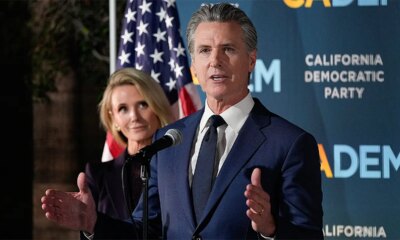Business
Disney faces class action lawsuit over employee data breach

Walt Disney Co. has been hit with a class action lawsuit accusing the Burbank-based entertainment giant of negligence, breach of implied contract and other misconduct in connection with a massive data breach that occurred earlier this year.
Plaintiff Scott Margel submitted the complaint on Thursday in Los Angeles County Superior Court against Disney and Disney California Adventure. The 32-page document also accuses the company of violating privacy laws by not doing enough to prevent or notify victims of the extent of the leak.
The class members, estimated to number in the thousands, are described in the complaint as individuals who gave “highly sensitive personal information” to Disney in connection with their employment at the company — information that was allegedly compromised in the breach.
Representatives of Disney did not immediately respond Friday to The Times’ request for comment.
The lawsuit cites an article published in September by the Wall Street Journal, which reported that a hacking group known as NullBulge publicly released data spanning more than 18,800 spreadsheets, 13,000 PDFs and 44 million internal messages sent via the workplace communication platform Slack.
According to the Journal, the compromised Slack messages contained sensitive information belonging to Disney cruise employees, including passport numbers, visa details, birthplaces and physical addresses; at least one spreadsheet listed the names, addresses and phone numbers of some Disney Cruise Line passengers. The publication later reported that Disney planned to stop using Slack after the breach.
The plaintiff and class members “remain, even today, in the dark regarding which particular data was stolen, the particular malware used, and what steps are being taken, if any, to secure their [personal information] going forward,” the complaint reads.
The plaintiff and class members “are, thus, left to speculate as to where their [data] ended up, who has used it and for what potentially nefarious purposes.”
In July, NullBulge said that it had leaked roughly 1.2 terabytes of Disney data in rebuke of the company’s treatment of artists, “approach to AI” and “pretty blatant disregard for the consumer.” The self-proclaimed hacktivists told CNN that they were able to penetrate Disney’s system thanks to “a man with Slack access who had cookies.”
A Disney spokesperson said in a statement at the time that the company was “investigating this matter.”
Margel is demanding that Disney take steps to reinforce its security system and educate class members about the risks associated with the breach. The plaintiff is also seeking unspecified damages and a jury trial.

Business
Video: The Hidden Number Driving U.S. Job Growth

new video loaded: The Hidden Number Driving U.S. Job Growth
By Ben Casselman, Christina Thornell, Christina Shaman, June Kim and Nikolay Nikolov
February 13, 2026
Business
Why Mattel now has a problem with Barbie

Barbie manufacturer Mattel took a hit this week after its superstar doll failed to deliver.
The El Segundo company behind many of the world’s most iconic toys was walloped in the stock market — its shares plunged 25% Wednesday — after it announced that holiday-season sales were weak and that it expects another slow year.
It was overoptimistic about how many Barbies and other products consumers would want and had to slash prices to move them, even as it grappled with higher costs from tariffs, analysts said.
“2025 was marked by uncertainty,” Ynon Kreiz, chief executive of the company, said after earnings were unveiled Tuesday.
While Mattel’s Hot Wheels were hot, and its party card game Uno attracted new fans, Barbie has been struggling. Mattel’s Fisher-Price line, which makes educational toys for infants, toddlers and preschoolers, also lagged.
The doll and its many variants have been losing momentum since her latest 15 minutes in the spotlight following the 2023 hit movie “Barbie.” This year, Mattel says it will increase its focus on making more digital games and toys tied to movie franchises.
Last year, its net sales were about $5.3 billion, down 1% from the year before, according to the company’s unaudited financial statements. Its projection for this year also disappointed investors. The company lost close to $1 billion in market value as investors dumped its shares.
The movie that was the fun half of the “Barbenheimer” summer took in close to $1.5 billion at the box office and rejuvenated buzz around the 60-something Barbie, sparking more than $150 million in sales from dolls and other related products. At the time, it seemed to validate the toymaker’s strategy of turning its legacy brands into modern media properties, with live-action films. It has not been able to repeat that success yet, and that failure has weighed on its earnings.
Despite efforts to create buzz around the Barbie brand — including a diabetes Barbie and an autism Barbie — gross billings for Barbie products slid 11% last year, following a similar decline in 2024.
Mattel on Tuesday said it plans to double down on its strategy to become, as its CEO called it, an “IP-driven play and family entertainment business.” That means it wants to make more money from video games and movies.
Though toys are foundational to Mattel, the company said it is trying to broaden its reach by focusing more on content licensing and digital games, which tend to be more profitable.
Mattel has long worked with Disney to make princess dolls and has partnered with Netflix to make toys inspired by characters from the 2025 movie “KPop Demon Hunters.” The K-pop-inspired products will ship in the spring, and Mattel expects them to boost doll sales.
This week, it announced a deal to develop and market toys tied to the Teenage Mutant Ninja Turtles franchise, which is scheduled to have a new movie next year. It can also expect a jump in interest around its toys connected to the Masters of the Universe franchise and Matchbox brand, both slated to have movies this year.
“Success in our toy business will drive success in entertainment, and success in entertainment will drive greater success in toys,” Kreiz said. “We are looking to fully capitalize on this virtuous cycle.”
The company literally doubled down on one of its biggest bets on digital games.
Mattel announced plans to spend around $160 million to acquire the other half of mobile games studio Mattel 163, a joint venture between Mattel and the Chinese internet and video game company NetEase.
The studio has released four games based on Mattel’s intellectual property since it was established in 2018.
Mattel plans to make more “games based on Mattel IP that drive sustained engagement for fans,” Kreiz said in a statement.
The acquisition will temporarily impact Mattel’s bottom line but is intended to “accelerate growth in top and bottom lines in 2027 and beyond,” Kreiz said on the call.
For some, Mattel’s big plans to diversify away from toys haven’t been successful enough to spark confidence that the company can pull it off this year.
Morningstar analyst Jaime Katz said Mattel’s digital strategy has not panned out in the decade since company leadership started touting it.
“Every year we’re expecting the next year to be a growth year,” Katz said. “It looks now like we’re going to have another year where it’s stuck.”
Business
Disney to pay $2.75 million to settle alleged violations of the California Consumer Privacy Act

Walt Disney Co. will pay $2.75 million to settle allegations that it violated the California Consumer Privacy Act by not fully complying with consumers’ requests to opt out of data sharing on its streaming services, the state attorney general’s office said Wednesday.
The Burbank media and entertainment company allegedly restricted the extent of opt-out requests, including complying with users’ petitions only on the device or streaming services they processed it from, or stopping the sharing of consumers’ personal data through Disney’s advertising platform but not those of specific ad-tech companies whose code was embedded on Disney websites and apps, the attorney general’s office said.
In addition to the fine, the settlement, which is subject to court approval, will require Disney to enact a “consumer-friendly, easy to execute” process that allows users to opt-out of the sale or sharing of their data with as few steps as possible, according to court documents.
“Consumers shouldn’t have to go to infinity and beyond to assert their privacy rights,” Atty. Gen. Rob Bonta said in a statement. “In California, asking a business to stop selling your data should not be complicated or cumbersome.”
A Disney spokesperson said in a statement that the company “continues to invest significant resources to set the standard for responsible and transparent data practices across our streaming services.”
“As technology and media continue to evolve, protecting the privacy and preserving the experience of Californians and fans everywhere remains a longstanding priority for Disney,” the spokesperson said.
The settlement with Disney stemmed from a 2024 investigation by the attorney general’s office into streaming devices and apps for alleged violations of the California Consumer Privacy Act, which governs the collection of consumers’ personal data by businesses.
Under the law, businesses that sell or share personal data for targeted advertising must give users the right to opt-out.
Disney’s $2.75-million payment is the largest such settlement under the state privacy act, Bonta’s office said.
The attorney general has also reached settlements with companies such as beauty retailer Sephora, food delivery app DoorDash and SlingTV for alleged violations of the privacy act.
-

 Politics1 week ago
Politics1 week agoWhite House says murder rate plummeted to lowest level since 1900 under Trump administration
-

 Alabama6 days ago
Alabama6 days agoGeneva’s Kiera Howell, 16, auditions for ‘American Idol’ season 24
-

 San Francisco, CA1 week ago
San Francisco, CA1 week agoExclusive | Super Bowl 2026: Guide to the hottest events, concerts and parties happening in San Francisco
-

 Ohio1 week ago
Ohio1 week agoOhio town launching treasure hunt for $10K worth of gold, jewelry
-

 Culture1 week ago
Culture1 week agoIs Emily Brontë’s ‘Wuthering Heights’ Actually the Greatest Love Story of All Time?
-

 News1 week ago
News1 week agoThe Long Goodbye: A California Couple Self-Deports to Mexico
-

 Politics1 week ago
Politics1 week agoTrump admin sued by New York, New Jersey over Hudson River tunnel funding freeze: ‘See you in court’
-

 Science1 week ago
Science1 week agoTuberculosis outbreak reported at Catholic high school in Bay Area. Cases statewide are climbing















